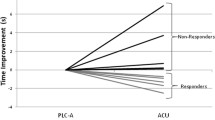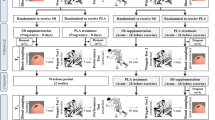Abstract
In the present study, 200-m swim time in highly trained male swimmers was measured on two consecutive days (Trial 1 and Trial 2) and under three conditions [(1) acute loading, AcL; (2) chronic loading, ChL; (3) Placebo, PLA]. No sodium bicarbonate (NaHCO3) was administered between Trial 1 and Trial 2 under each condition. Blood lactate concentration ([La−]), base excess of extracellular fluid (BEecf), plasma bicarbonate concentration ([HCO3 −]) and pH were determined before and after capsule administration as well as at 0, 3, 5, 15 and 30 min after each 200-m swim trial. Swim time was not different among AcL, ChL or PLA for Trial 1 or 2 and we observed no change in 200-m swim time from Trial 1 to 2 under any condition (F = 0.48, P = 0.80). [HCO3 −], pH and BEecf measured after capsule administration was higher during AcL and ChL when compared with PLA (P < 0.05). We did not observe any difference in blood [La−] between the three conditions at any stage post-exercise (P > 0.05). The results indicate that acute and chronic loading of NaHCO3 does not improve 200-m swim time in highly trained male swimmers.






Similar content being viewed by others
References
Anderson M, Hopkins W, Roberts A, Pyne D (2008) Ability of test measures to predict competitive performance in elite swimmers. J Sports Sc 26(2):123–130
Arnett MG (2002) Effects of prolonged and reduced warm-ups on diurnal variation in body temperature and swim performance. J Strength Cond Res 16(2):256–261
Bishop D, Claudius B (2005) Effects of induced metabolic alkalosis on prolonged intermittent-sprint performance. Med Sci Sports Exerc 37(5):759–767
Bishop D, Edge C, Davis SC, Goodman C (2004) Induced metabolic alkalosis affects muscle metabolism and repeated-sprint ability. Med Sci Sports Exerc 36(5):807–813
Bovenschen HJ, Janssen MJ, Oijen MG, Laheij RJ, Rossum LG, Jansen JB (2006) Evaluation of a gastrointestinal symptoms questionnaire. Dig Dis Sci 51:1509–1515
Brien DM, McKenzie DC (1989) The effect of induced alkalosis and acidosis on plasma lactate and work output in elite oarsmen. Eur J Appl Physiol Occup Physiol 58(8):797–802
Douroudos II, Fatouros IG, Gourgoulis V, Jamurtas AZ, Tsitsios T, Hatzinikolaou A, Margonis K, Mavromatidis K, Taxildaris K (2006) Dose-related effects of prolonged NaHCO3 ingestion during high-intensity exercise. Med Sci Sports Exerc 38(10):1746–1753
Gao JP, Costill DL, Horswill CA, Park SH (1988) Sodium bicarbonate ingestion improves performance in interval swimming. Eur J Appl Physiol 58:171–174
Goldfinch J, Mc Naughton L, Davies P (1988) Induced metabolic alkalosis and its effects on 400 m racing time. Eur J Appl Physiol 57(1):45–48
Hollidge-Horvat MG, Parolin ML, Jones NL, Heigenhauser GJ, Wong D (2000) Effect of induced metabolic alkalosis on human skelatal muscle metabolism during exercise. Am J Physiol Endocrinol Metab 178:E316–E329
Lindh AM, Peyrebrune MC, Ingham SA, Bailey DM, Folland JM (2008) Sodium bicarbonate improves swimming performance. Int J Sports Med 6:519–524
Matson LG, Tran ZU (1993) Effects of sodium bicarbonate ingestion on anaerobic performance: a meta-analytic review. Int J Sport Nut 3:2–28
McNaughton L (1992) Sodium bicarbonate ingestion and its effects on anaerobic exercise of various durations. J Sports Sci 10(5):425–435
McNaughton L, Thompson D (2001) Acute versus chronic sodium bicarbonate ingestion and anaerobic work and power output. J Sports Med Phys Fit 41(4):456–462
McNaughton L, Curtin R, Goodman G, Perry D, Turner B, Showell C (1991) Anaerobic work and power output during cycle ergometer exercise: effects of bicarbonate loading. J Sports Sci 9(2):151–160
McNaughton L, Dalton B, Palmer G (1999) Sodium bicarbonate can be used as an ergogenic aid in high-intensity, competitive cycle ergometry of 1 h duration. Eur J Appl Physiol 80(1):64–69
Mero AA, Keskinen KL, Malvela MT, Sallinen JM (2004) Combined creatine and sodium bicarbonate supplementation enhances interval swimming. J Strength Cond Res 18(2):306–310
Pierce EF, Eastman NW, Hammer WH, Lynn TD (1992) Effect of induced alkalosis on swimming time trials. J Sports Sci 10(3):255–259
Price MJ, Singh M (2008) Time course of blood bicarbonate and pH 3 hours after sodium bicarbonate ingestion. Int J Sports Phys Per 3:240–242
Requena B, Zabala M, Padial P, Feriche B (2005) Sodium bicarbonate and sodium citrate: ergogenic aids? J Strength Cond Res 19(1):213–224
Robinson K, Verity L (1987) Effect of induced alkalosis on rowing ergometer performance (REP) during repeated 1-mile workouts. Med Sci Sports Exer 19:S68
Stephens TJ, McKenna MJ, Canny BJ, Snow RJ, McConell GK (2002) Effect of sodium bicarbonate on muscle metabolism during intense endurance cycling. Med Sci Sports Exerc 34(4):614–621
Sutton JR, Jones NL, Toews CJ (1981) Effect of pH on muscle glycolysis during exercise. Clin Sci 61:331–338
Zajac A, Cholewa J, Poprzecki S, Waskiewicz Z, Langfort J (2009) Effects of sodium bicarbonte ingestion on swim performance in youth athletes. JSSM 8:45–50
Zinner C, Wahl P, Achtzehn S, Sperlich B, and Mester J (2011) Effects of bicarbonate ingestion and high intensity exercise on lactate and H(+)-ion distribution in different blood compartments. Eur J Appl Physiol
Acknowledgments
This research was funded in part by the Centre of Excellence, Queensland Academy of Sport and Swimming Australia.
Author information
Authors and Affiliations
Corresponding author
Additional information
Communicated by Susan A. Ward.
Rights and permissions
About this article
Cite this article
Joyce, S., Minahan, C., Anderson, M. et al. Acute and chronic loading of sodium bicarbonate in highly trained swimmers. Eur J Appl Physiol 112, 461–469 (2012). https://doi.org/10.1007/s00421-011-1995-z
Received:
Accepted:
Published:
Issue Date:
DOI: https://doi.org/10.1007/s00421-011-1995-z




